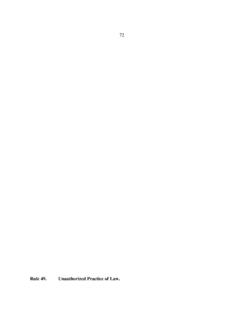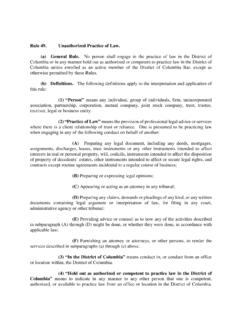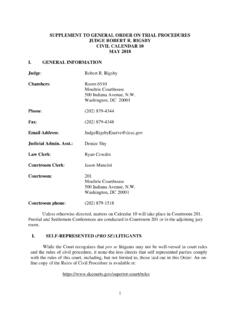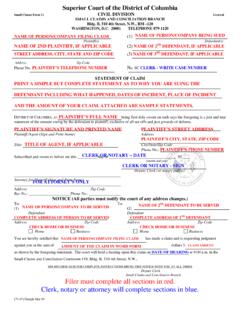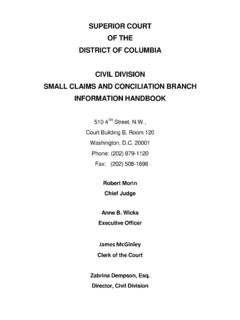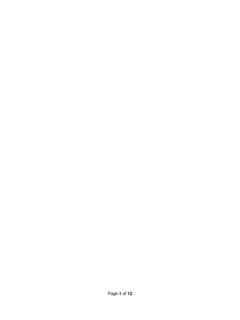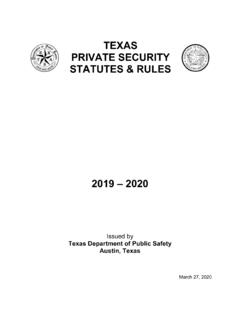Transcription of Rule 49. Unauthorized Practice of Law. - DC Courts
1 rule 49 . Unauthorized Practice of Law. (a) IN GENERAL. Except as otherwise permitted by these rules , no person may engage in thepractice of law in the District of Columbia or in any manner hold out as authorized or competentto Practice law in the District of Columbia unless enrolled as an active member of the Bar.(b) DEFINITIONS. The following definitions apply to this rule:(1) Person means any individual, group of individuals, firm, unincorporated association,partnership, corporation, mutual company, joint stock company, trust, trustee, receiver, or other legal or business entity. (2) Practice of law means providing professional legal advice or services where there is aclient relationship of trust or reliance. One is presumed to be practicing law when engaging in any of the following conduct on behalf of another: (A)preparing any legal document, including: a deed; a mortgage; an assignment; a discharge; a lease; a trust instrument; an instrument intended to affect interests in real or personal property; a will; a codicil; an instrument intended to affect the disposition of property of decedents estates; an instrument intended to affect or secure legal rights; and a contract except a routine agreement incidental to a regular course of business;(B)preparing or expressing a legal opinion;(C)appearing or acting as an attorney in any tribunal.
2 (D)preparing any claim, demand, or pleading of any kind, or any written documentcontaining legal argument or interpretation of law, for filing in any court , administrative agency, or other tribunal; (E)providing advice or counsel as to how an activity described in rule 49 (b)(2)(A)-(D)might be done, or whether it was done, in accordance with applicable law; or (F)furnishing an attorney or attorneys, or other persons, to render the services described inRule 49 (b)(2)(A)-(E). (3) In the District of Columbia means conduct in, or conduct from an office or locationwithin, the District of Columbia. (4) Hold out as authorized or competent to Practice law in the District of Columbia means toindicate in any manner to any other person that one is competent, authorized, or available to Practice law from an office or location in the District of Columbia.
3 Among the terms which may give that indication are esquire, lawyer, attorney, attorney at law, counsel, counselor, counselor at law, contract lawyer, trial advocate, legal representative, legal advocate, notario, and judge. (5) Committee means the District of Columbia court of Appeals Committee onUnauthorized Practice of Law, as constituted under this rule. (c) EXCEPTIONS. The following activities are permitted as exceptions to rule 49 (a) if theperson is not otherwise engaged in the Practice of law or holding out as authorized or competentto Practice law in the District of Columbia.(1)United States Government Employee. A person may provide legal services to the UnitedStates as an employee thereof. (2)Representation Before United States Government Special court , Department, or Agency.
4 Aperson may provide legal services to members of the public solely before a special court , department, or agency of the United States, when: (A)the legal services are confined to representation before such fora and other conductreasonably ancillary to that representation; (B)the conduct is authorized by statute, or the special court , department, or agency hasadopted a rule expressly permitting and regulating that Practice ; and (C)if the person has an office in the District of Columbia, the person expressly givesprominent notice in all business documents of the person s bar status and that his or her Practice is limited consistent with rule 49 (c). (3) Practice Before United States court . A person may provide legal services in or reasonablyrelated to a pending or potential proceeding in any court of the United States if the person has been or reasonably expects to be admitted to Practice in that court , but if the person has an office in the District of Columbia, the person must expressly give prominent notice in all business documents of the person s bar status and that his or her Practice is limited consistent with rule 49 (c).
5 (4)District of Columbia Employee. A person may provide legal services to the government ofthe District of Columbia during the first 360 days of employment as a lawyer for the government of the District of Columbia, when the person: (A) is authorized to Practice law and in good standing in another state or territory;(B) is not disbarred or suspended for disciplinary reasons;(C) has not resigned with charges pending in any jurisdiction or court ; and(D) has been authorized by her or his government agency to provide such services.(5)Representation Before District of Columbia Department or Agency. A person may providelegal services to members of the public solely before a department or agency of the District of Columbia government, when: (A) the representation is confined to appearances in proceedings before tribunals of thatdepartment or agency and other conduct reasonably ancillary to those proceedings; (B)the representation is authorized by statute, or the department or agency has authorized itby rule and undertaken to regulate it; (C)if the person has an office in the District of Columbia, the person expressly givesprominent notice in all business documents of the person s bar status and that his or her Practice is limited consistent with rule 49 (c).
6 And (D)if the person does not have an office in the District of Columbia, the person expresslygives written notice to clients and other parties, with respect to any proceeding before tribunals of that department or agency and any conduct reasonably ancillary to those proceedings, of the person s bar status and that his or her Practice is limited consistent with rule 49 (c). (6)Internal Counsel. A person may provide legal advice only to one s regular employer, whenthe employer does not reasonably expect that it is receiving advice from a person authorized to Practice law in the District of Columbia. (7)Pro Hac Vice in the Courts of the District of Columbia. A person may provide legalservices in or reasonably related to a pending or potential proceeding in a court of the District of Columbia, if the person has been or reasonably expects to be admitted pro hac vice, in accordance with the following provisions.
7 (A)Limitation to 5 Applications Per Year. No person may apply for admission pro hac vicein more than 5 cases pending in the Courts of the District of Columbia per calendar year, except for exceptional cause shown to the court . (B)Applicant Declaration. Each application for admission pro hac vice must beaccompanied by a declaration under penalty of perjury: (i) certifying that the applicant has not applied for admission pro hac vice in more than 5cases in Courts of the District of Columbia in this calendar year; (ii) identifying all jurisdictions and Courts where the applicant is authorized to Practice lawand whether the applicant is in good standing in each such jurisdiction or court ; (iii) certifying that there are no disciplinary complaints pending against the applicant forviolation of the rules of any jurisdiction or court , or describing all pending complaints.
8 (iv) certifying that the applicant has not been suspended or disbarred for disciplinaryreasons or resigned with charges pending in any jurisdiction or court , or describing the circumstances of all suspensions, disbarments, or resignations; (v) certifying that the applicant has not had an application for admission to the Bardenied, or describing the circumstances of any denials; (vi) agreeing promptly to notify the court if, during the course of the proceeding, theapplicant is suspended or disbarred for disciplinary reasons or resigns with charges pending in any jurisdiction or court ; (vii) identifying the name, address, and Bar number of the Bar member withwhom the applicant is associated under Superior court Rule of Civil Procedure 101; (viii) certifying that the applicant does not Practice law or hold out as authorized orcompetent to Practice law in the District of Columbia or that the applicant qualifies under an identified exception in rule 49 (c); (ix) certifying that the applicant has read the rules of the District of Columbia court ofAppeals and the relevant division of the Superior court , and has complied with District of Columbia court of Appeals rule 49 and, as applicable, Superior court Rule of Civil Procedure 101; (x) explaining the reasons for the application.
9 (xi) acknowledging the power and jurisdiction of the Courts of the District of Columbiaover the applicant s professional conduct in or related to the proceeding; and (xii) agreeing to be bound by the District of Columbia rules of Professional Conduct in thematter if the applicant is admitted pro hac vice. (C)Office in the District of Columbia Prohibited. A person who maintains or operates froman office or location within the District of Columbia that is for the Practice of law may not be admitted to Practice before a court of the District of Columbia pro hac vice, unless that person qualifies under another exception provided in rule 49 (c). (D)Supervision. Any person admitted pro hac vice must comply with Superior court Rule ofCivil Procedure 101 and other applicable rules of the District of Columbia Courts .
10 (E)Filing Process. The applicant must submit a copy of the application to the Committee,pay an application fee, and receive a receipt for payment of the fee. The applicant must then file the application with the receipt in the appropriate office of the Clerk of court . An application will not be accepted for filing without the required receipt. (F)Application Fee. The application fee for admission pro hac vice is $100. The fee may bepaid in cash, by credit card, or by cashier s check, certified check, or money order made payable to Clerk, District of Columbia court of Appeals. The fee is waived for a person whose conduct is covered by rule 49 (c)(9) or whose client s application to proceed in forma pauperis has been granted. (G)Power of the court .
